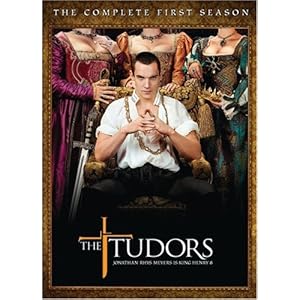
The Tudors is one of those shows that deserves to have quotation marks around the word historical in their descriptions. It's not that they go out of their way to make things up, but it's the simple fact that they are more concerned with telling a story and creating a mood than accurately portraying what happened. The Tudors tells the story of King Henry VIII, the guy we all ready about in school who had a bunch of wives and created the Church of England. Because of the limitations of covering a forty year reign in 38 episodes over the course of four years, many things are compressed and forgotten and compromised in order for it to be a series and not just a documentary.
And that's okay, really. Rome did the same thing, and it was pretty outstanding. But while I thought The Tudors was decent, something about it felt limited. Despite using Henry's parade of marriages as an excuse to turn him into a sex-crazed lunatic, the show really wasn't as trashy as I thought it would be. I wasn't expecting Spartacus: Blood and Sand levels of softcore pornography and fountains of blood, but I was definitely expecting more than there was. Long stretches of the show are merely people meeting at court and planning changes for the kingdom and stuff like that while all of the wars Henry got into occurred mostly off screen, and the worst thing you can really say about is that it's actually a little boring sometimes. The show gets in its fair share of sex scenes and decapitations (and hangings, and burnings at the stake, and drawing and quarterings), but it's not quite debaucherous enough to be pure fun, nor is it really well written enough to pull off a fully respectful treatment of the material. It was popular enough to stay on the air for as long as it did, but I have trouble imagining an audience that was completely satisfied with the series' tone.
Jonathan Rhys Meyers plays King Henry, and I was mostly pleased by his work. He's not exactly the most talented actor, but one of the most important things for the role was that he have a commanding, authoritative presence, which he does. I was also reasonably impressed by the way he handled the character's increasing age as the show wore on. The new Superman Henry Cavill plays the Duke of Suffolk, and is the only actor in a major role to appear in all four seasons besides Rhys Meyers. Unlike most other characters who exist to provide something for Henry to deal with (or have sex on top of), Cavill is mostly just a loyal friend who has problems of his own to deal with, which were often a nice change of pace from the main plot. Otherwise there are a lot of beautiful women who make their way through the court and often die, as well as a number of respected and/or recognizable actors appearing in brief but significant roles, like Sam Neill as a corrupt cardinal who's nonetheless on Henry's side or Peter O'Toole as the pope, who isn't having any of the king's Church of England crap.
So for four seasons we see Meyers grow from a young king to a nearly crippled old man, trying to find a wife that will bear him a male heir, juggling alliances with multiple other finicky monarchs, and rooting out dissent among his people. He puts a lot of people to death, ignores logic to support his own deluded beliefs, and never seems to fully connect with anyone around him. Some subplots were a lot more interesting than others, and you never know when a character you like will disappear or one you hate will hang on for way too long. It's a mostly watchable show that never gets too annoying to be unbearable or too good to make you really excited to keep going. Despite all this though, I found myself surprisingly moved as the series wound down and ended on its own terms. Not incredibly touched really, just surprised that I was a bit sad to see the slow decline of a man who's come to see that his best days are long behind him. The shift to old guy makeup seemed a bit drastic, but it worked nonetheless. The show was entirely written by creator Michael Hirst, and I think that might have been a mistake, because more people working on it could have meant a tighter and more thoroughly entertaining series. But in the end I kept watching it, because I enjoy these sorts of takes on interesting historical eras despite myself. Next I'm going to check out The Borgias, a show created by Neil Jordan that Hirst is producing.
AAAAAGGGHHHH
16 years ago


































No comments:
Post a Comment